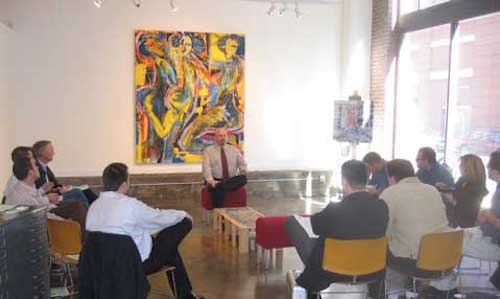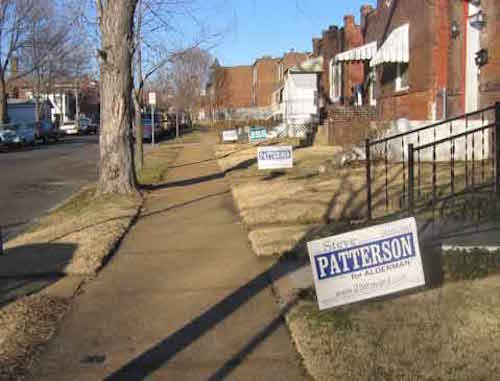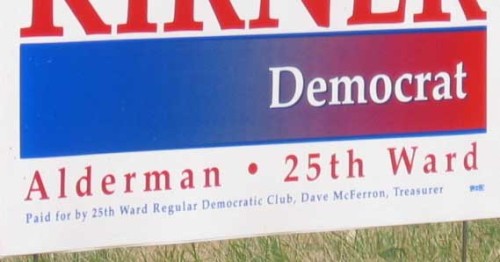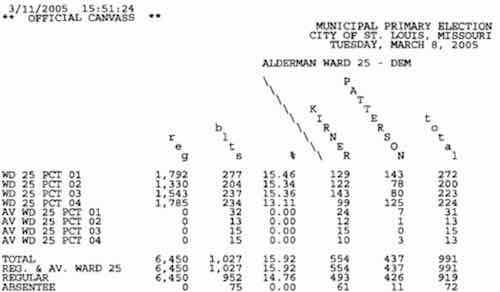A Decade Since Steve Patterson Filed To Run For The St. Louis Board Of Alderman
A decade ago today I decided I wasn’t going to let an incumbent win four years in office because of a lack of a challenger. If she, Dorothy Kirner, wanted a four-year term she was going to have to work for it. Two months later I lost the primary, receiving 44.1% of the vote. Not bad considering I started putting together my campaign after filing on the very last day, instead of months earlier.
Here I was a candidate but I had no team, no money, no plan. My check for the filing fee didn’t even clear, thankfully then-Democratric party chair Brian Wahby allowed me to replace it rather than disqualify me from the race. At this point I was an unknown, this blog had only been around a little over two months.
I had been paying attention though, the day before filing I posted:
Carl Coats, a former city building inspector, had filed to challenge Dorothy Kirner for the 25th Ward aldermanic seat. On 1/4/05 he withdrew himself as a candidate. Unless someone files tomorrow Dorothy Kirner will win by default. This is my ward – I was hoping someone would mount a good challenge to Kirner. (See 25th Ward Challenger Carl Coats Has Withdrawn from Race).
That night I realized nobody else was going to run, but why not me? I was 37 and self-employed, so I had the time. I owned three properties in the ward, one co-owned with a friend, so I was invested. I had ideas I wanted to become part of the conversation during the election. I called a few people that night and the next day I went down to the Board of Election Commissioners to file.
People I know & people I just met stepped up to offer help, money, advice, etc. — too many to thank them all individually.





Early press was discouraging, such as the story ‘Incumbent aldermen assured of re-election’ in the South Suburban Journal five days after filling closed:
Incumbent Alderman Dorothy Kirner, 70, of the 3700 block of Taft Avenue, faces challenger Steven L. Patterson, 37, a real estate agent living in the 3100
block of Mount Pleasant Street. The primary is March 8.“I have lived in the neighborhood for 48 years,” said Kirner, who was elected June 15, 2004 to succeed her husband, Alderman Dan Kirner, who died in office. Stressing her experience, she said, “I have been around longer than my husband was in the political field.”
But Patterson, who has lived in the neighborhood for 10 years, said he had a lot of experience in getting things done, in looking at development and managing people and projects.
“I think the fact that I haven’t spent many years in politics is actually a benefit to me. It’s time for a fresh approach to the ward,” he said.
As the campaign progressed the coverage did improve, from the Vital Voice, an LGBT publication, just days before the primary:
Steve Patterson is busy knocking on doors and talking to residents throughout the 25th Ward in hopes of becoming the first openly gay individual to serve in the 28-member St. Louis Board of Alderman.
Patterson, who turns 38 on Feb. 28, is mounting a serious challenge to unseat incumbent Alderwoman Dorothy Kirner in the March 8 primary. Kirner, 69, was elected last June to serve the remaining ten months of her late husband, Dan Kirner’s term.
“What brought me into politics is the desire to see change and realizing that I couldn’t sit here and complain that no one was taking charge without realizing that maybe that should be me,” said Patterson of his insurgent campaign. “The campaign experience is awesome. I’m really enjoying getting involved and being involved. It actually feels really good to be this civic minded.”
The 25th Ward, which includes neighborhoods around far South Grand is ethnically diverse with large Caucasian, African American, Bosnian and Vietnamese communities. The ward also has a representative gay, lesbian, bisexual and transgender (GLBT) community. Nevertheless, the heavily Democratic 25th is socially conservative and accordingly voted to approve Amendment 2 last August witch banned gay marriage in the Missouri Constitution.
Yes, only one of the city’s 28 wards voted in favor of Amendment 2 and I, an openly gay man, was running for alderman in that ward just 4 months later. What was I thinking? I do remember knocking on one door, the woman who answered asked me if I supported gay rights or same-sex marriage. When I told her I was gay I turned a sceptic stranger into a voter, we remain friends today.
Although Kirner won a full 4-year term I have no regrets about running, one of the best decisions I ever made. I do have some hindsight from my one and only political campaign:
- Plan well ahead, don’t wait until the last day to file to start putting the campaign together.
- Run to win, but know that becoming serious candidate makes you a winner even if you don’t win the election.
- Video record your debate, I wish I’d done so!
This election was prior to social media — no Facebook or Twitter! Like I indicated in the photos above, I had a blog/website, one of the earliest aldermanic campaigns to have one. I raised & spent about $1,200m Kirner raised & spend about $12,000 — she had to hire consultants to build a website. She showed up for a debate on the issues, something she wouldn’t have had to do otherwise.
One issue raised during our campaign was a Citizen Review Board, I favored it while Kirner, whose late husband had been a police officer, opposed external review of the police. The Board of Aldermen passed a Civilian Review Board bill a year later — vetoed by Mayor Slay.

After serving her one term, Dorothy Kirner didn’t seek a 2nd in 2009, setting up a 4-way race for the open seat. Openly gay Shane Cohn won the democratic primary with 487 votes (46.25%), this 4-way race had 1,053 votes vs 991 votes in my 2005 race.
Filing for the March 2015 primary has closed, though independent candidates can still get on the ballot in the April general by collecting signatures. Those of you in odd numbered wards who are considering running in 2017 should begin planning now.
Tomorrow I’ll look at the 2015 spring municipal races.
— Steve Patterson
Current city population, 318,000+ divided by 28 wards equals 11,400 residents per ward. The fact that roughly 1,000 voters in each competetive ward (and probably less than 25,000 citywide) decide the fate of any election is scary, especially since only 10,000 – 13,000 need to actually support the winning candidates . . . .
Within that 318k city population, there are a total of 178,769 registered voters (per 2014 General Election results).
Election turnout is an interesting situation, especially as it relates to aldermanic elections. With the extremely low amount of votes needed to win a ward, it’s somewhat surprising that more political “outsiders” don’t run. A young, engaged citizen with a good local network and a basic ability in campaigning/public speaking should be able to raise enough support to seriously content within most wards.
I think we saw that a bit in the recent 15th Ward Special Election, with some new faces recognizing the ease of entry and saying, as Steve did ten years back, “Why not me?” I was hoping that would spill over to this next round of elections, but it hasn’t really.
That’s really why the Board reduction effort, to me anyway, seems like a step in the wrong direction. Once the reduction takes place, entry for newcomers becomes more difficult as the “powers that be” can then circle their wagons on a smaller pool of wards and control a much larger swath of the City with less moving parts.
I see the upcoming board reduction differently. Currently aldermen are low-paid complaint processing clerks that have to share a tiny office, not very appealing. The reduction means they’ll need to actually focus on legislating, not worrying about stop signs & dumpsters. We should see more people competing for these offices.
I agree that the aldermen should be paid more and have more resources allocated for staffing, but I don’t think the piddling processing requests will stop. If anything, it’ll become more of an issue as less aldermen have to deal with more small requests in a larger geographic area.
The best thing going for independent/outside candidates right now is the low point of entry. The goal, obviously, should be to increase voter turnout, and the best way to do that is by consistently offering a strong and varied slate of candidates. If the ward reduction helps that, then that’s great. But if — like I suggested above — the reduction allows for tightened control by the local Democratic machine, it only serves to further dissuade citizens from getting involved and recognizing actionable change through their involvement/effort.
In my 24+ years in St. Louis Scott Ogilvie is the only Independent to have won, except for Democrats that ran again then switched back after being reelected.
The bar is much higher for Independents, they must collect signatures just to appear on the ballot. So many consider the Democratic primary in March the election they stay home during the April general — that’s a huge hurdle to overcome.
If Denver is any indication, being responsible for a larger number of consituents means that “piddling processing requests” will referred directly to the responsible city agency, not handled and shepherded through every step by the alderman. I suspect that this type of “personal attention” is a symptom of making work, since most wards don’t have a lot else that requires legislative attention.
After digesting this post for several days, I’m still trying to figure out what sexual orientation has to do with any of this.
You don’t understand now rare it has been for an openly gay person to run for local public office?
What exactly do you have to do to get on as an independent canidate?
Independent candidates must collect signatures, the number is a percentage of the number of voters in the last mayoral election — visit the Board of Elections for specifics. http://www.stlelections.com/candidate-information/how-to-file/